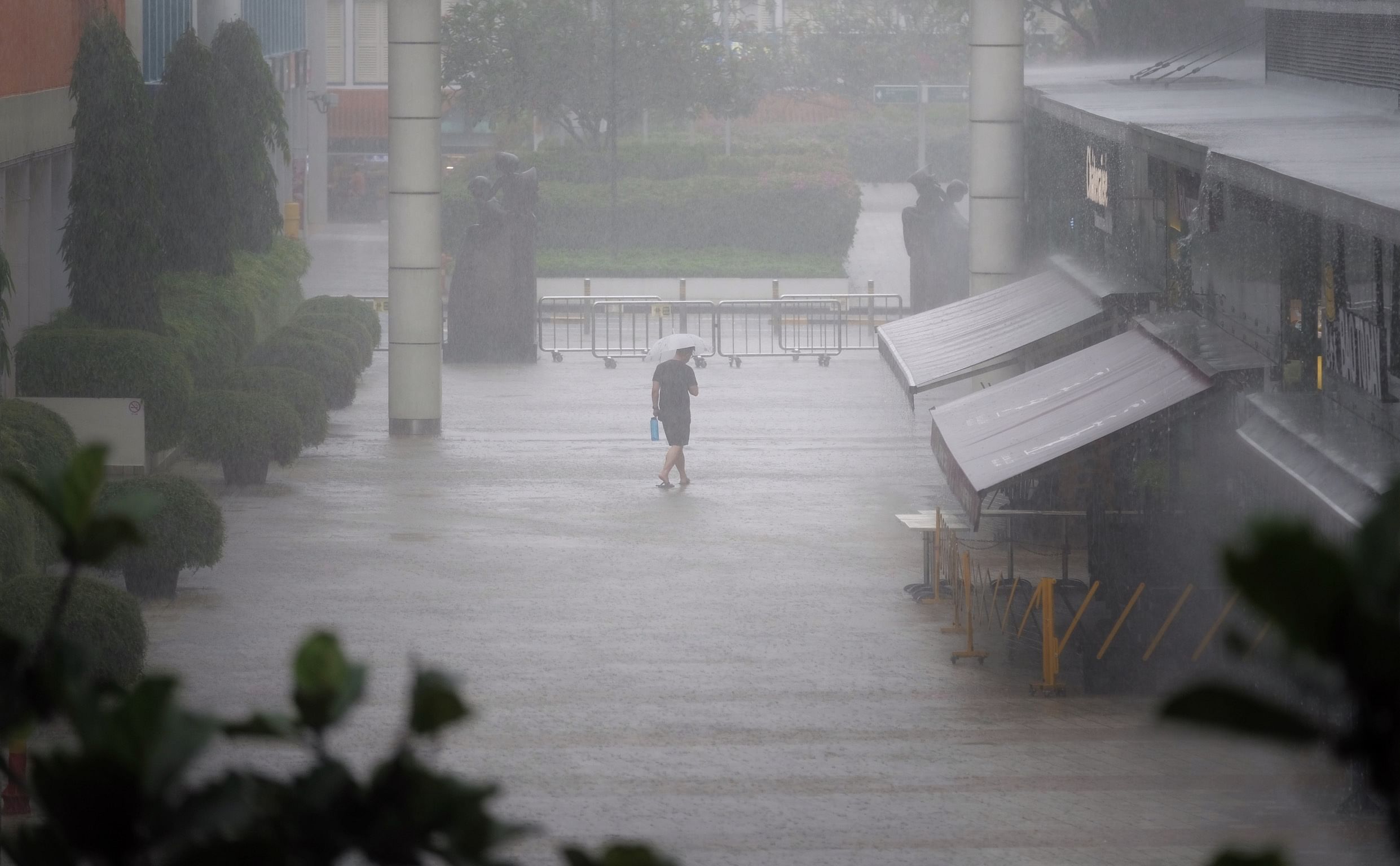IPCC report indicates Singapore could take bigger hits from climate change
Sign up now: Get ST's newsletters delivered to your inbox

Singapore has already experienced warming higher than the global average because of the urban heat island effect.
ST PHOTO: LIM YAOHUI
SINGAPORE - The harshest impacts of climate change have been elsewhere so far, but a report published on Monday (Aug 9) indicates that Singapore must brace itself for tougher times ahead.
If planet-warming emissions do not come down to net-zero by around 2050, more punishing heatwaves, severe coastal flooding events, and bouts of heavier rain could be on the cards for this island.
"Cities intensify human-caused warming locally, and further urbanisation together with more frequent hot extremes will increase the severity of heatwaves," noted the Intergovernmental Panel on Climate Change (IPCC) in its summary for policymakers.
Singapore has already experienced warming higher than the global average because of the urban heat island effect - a phenomenon of urban structures trapping heat in the day and releasing it at night.
Local temperatures are 1.8 deg C higher than they were in 1948, data from the National Environment Agency's Meteorological Service Singapore (MSS) showed. In contrast, global temperatures have warmed by about 1.1 deg C from pre-industrial times, which ended around 1850.
And the Centre for Climate Research Singapore - a unit under the MSS - said the latest report suggests that even higher temperatures will be felt here in the coming decades.
This finding comes amid Singapore's efforts to make the city cooler, through planting more trees in urban spaces and a pilot programme involving 130 Housing Board blocks in Tampines being coated with heat-reflective paint.
But Singapore Management University climate scientist Winston Chow, who is an expert on the impacts of climate change on cities, said temperatures above 35 deg C in Singapore would be an uncomfortable experience for many due to the humid environment.
Humidity magnifies thermal discomfort, said Prof Chow, who contributes to the IPCC reports.
But while humans can adapt to this with air-conditioning and shade, the country's native flora and fauna cannot. "Our trees and animals on land and sea don't have that luxury if there's a prolonged heatwave."
Another worrying indicator of climate change for the island will be the rising tides. As the world warms, ocean waters expand and land ice melts, raising water levels.
Global mean projections in the latest report, of sea levels rising up to about 1m by 2100, do not differ significantly from past IPCC reports. But there was more information about the possibility of extreme sea level events, which have low probability of happening but can be very damaging when they do.
Said the IPCC: "Extreme sea level events that occurred once per century in the recent past are projected to occur at least annually at more than half of all tide gauge locations by 2100." Tide gauges are tools used by scientists to monitor changes in sea level relative to land.
The Centre for Climate Research Singapore said processes such as instabilities in marine ice cliffs - which are sea-facing blocks of ice that act as a "door-stopper" preventing land ice from entering the ocean - could potentially contribute more than one additional metre of sea level rise by the end of the 21st century, adding to the current projected global mean sea level rise.
Professor Benjamin Horton, director of the Nanyang Technological University's Earth Observatory of Singapore, who was a review editor for the chapter on sea level changes, said this was an ongoing area of study.
"Extrapolations from sparse observations of a poorly understood process mean that resulting predictions of ice cliff collapse on future sea level rise have deep uncertainty," he said.
Scientists use observational data to develop and validate models, which are in turn used to make projections into the future. The lack of data may make it difficult to come up with such forecasts with any certainty.
Prof Horton said a big concern for the future is the melting of the planet's two large ice sheets - Greenland and Antarctica. While melting has been mostly limited to mountain glaciers in the 20th century, he said satellite-based measurements of the ice sheets show that this melting is accelerating.
If all the ice in Greenland melted, it would raise global sea levels by 7m he said.
"Antarctica is 20,000 times the size of Singapore, two to three kilometres thick, and has enough water to raise sea levels by 65m," Prof Horton added. "That is more than a third of the height of the Singapore Flyer and seven times the height of the Merlion statue. If a few per cent of the Antarctic ice sheet were to melt, it would cause devastating impacts."
As for rainfall, the IPCC said that in general, bouts of rain could become more intense and frequent with each additional degree of warming.

The IPCC said that in general, bouts of rain could become more intense and frequent with each additional degree of warming.
PHOTO: ST
South-east Asia would also likely experience this, resulting in flash floods if ground is covered with concrete and if drainage systems are overwhelmed, but more research has to be done to see if Singapore will experience this.
This is because rainfall is highly variable. If Singapore were a bathtub and rain falling over it came from taps feeding into it, climate change would just be one spigot.
Rainfall is also influenced by other factors, including vegetation and the topography of the surrounding areas, since terrain and coastlines influence how winds transport moisture.
"The science around climate change attribution is still evolving, and MSS will continue to study this, along with the impact of climate change on Singapore's weather," said its spokesman.
The latest report, of more than 1,000 pages, produced by the IPCC's Working Group 1, examines the physical basis of climate change. It is the first of three reports that will make up the IPCC's Sixth Assessment Report to be published next year.
The Centre for Climate Research Singapore said it is studying the IPCC's latest report, and working to contextualise the findings for the Republic.
Singapore's third national climate change study is expected to be completed by the end of next year, said the MSS spokesman in a statement.
"The findings will guide the ongoing planning and implementation of adaptation measures to safeguard Singapore against the impact of climate change. These measures will be continually reviewed and adjusted, as new knowledge and information on the effects of climate change become available," she added.
Key takeaways from the report
The following are some of the key conclusions from the UN climate panel's comprehensive assessment of climate change caused by mankind.
Temperatures will keep rising
The report describes possible futures depending on how dramatically the world cuts emissions.
But even the severest of cuts is unlikely to prevent global warming of 1.5 deg C above pre-industrial temperatures.
Without immediate steep emissions cuts, though, average temperatures could cruise past 2deg C by the end of the century.
Weather is getting extreme
Weather extremes, once considered rare or unprecedented, are becoming more common - a trend that will continue even if the world limits global warming to 1.5 deg C.
Severe heat waves that happened only once every 50 years are now happening roughly once a decade. Tropical cyclones are getting stronger. Most land areas are seeing more rain or snow fall in a year. Severe droughts are happening 1.7 times as often. And fire seasons are getting longer and more intense.
Seas will rise no matter what
Sea levels are sure to keep rising for hundreds or thousands of years. Even if global warming were halted at 1.5 deg C, the average sea level would still rise about 2m to 3m, and maybe more.
Running out of time
Meeting the 2015 Paris Agreement goal of limiting warming to 1.5 deg C will require sticking to a "carbon budget", a term describing how much additional carbon can be pumped into the atmosphere before that goal is likely out of reach.
The world is now on track to use up that budget in about a decade.
REUTERS


